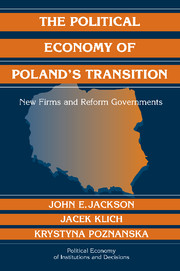Book contents
- Frontmatter
- Contents
- List of Tables
- List of Figures
- Acknowledgments
- List of Abbreviations
- 1 Why Poland?
- 2 The Dynamics of the Polish Political Economy, 1990–1997
- 3 Creative Destruction and Economic Transition
- 4 The Social and Distributional Costs of Transition
- 5 Individual Attitudes and Voting
- 6 De Novo Job Creation and Election Returns
- 7 Liberal Economic Interests and Seat Allocations
- 8 The Political Economy after 1997
- 9 The Political Economy of Transition: Why Poland?
- Appendix A Assessing Measures of New and Small Firms in Poland
- References
- Index
- Titles in the series
6 - De Novo Job Creation and Election Returns
Published online by Cambridge University Press: 07 August 2009
- Frontmatter
- Contents
- List of Tables
- List of Figures
- Acknowledgments
- List of Abbreviations
- 1 Why Poland?
- 2 The Dynamics of the Polish Political Economy, 1990–1997
- 3 Creative Destruction and Economic Transition
- 4 The Social and Distributional Costs of Transition
- 5 Individual Attitudes and Voting
- 6 De Novo Job Creation and Election Returns
- 7 Liberal Economic Interests and Seat Allocations
- 8 The Political Economy after 1997
- 9 The Political Economy of Transition: Why Poland?
- Appendix A Assessing Measures of New and Small Firms in Poland
- References
- Index
- Titles in the series
Summary
Individual attitudes and votes are only the beginning of the electoral process. How individual choices translate into votes for the different parties in their respective districts, and then how the district vote distributions determine the parties' shares of the seats in the parliament are critical issues. This chapter examines the district voting returns in Poland's 1993, 1995, and 1997 elections and the allocation of seats that followed from these votes. This analysis is the acid test for our proposition about the development of a constituency supporting the continuation of the market reforms. If this constituency cannot affect election outcomes and the parties' strength in parliament, then evidence about individual attitudes and behavior is interesting but insignificant.
The theme in this chapter is the continuing examination of the connection between new economic activity and support for economically liberal parties and whether this support will offset some of the opposition to the reforms generated by the economic hardships. We want to know both the magnitude of this association so that we can estimate how many votes more de novo jobs might have stimulated and the stability of the association. If the liberal constituency is to be influential, its presence must be evident over time and not just in one election. Evidence of a consistent relationship between measures of the de novo economy and votes for the reform party or parties would lend greater credence to our basic argument.
- Type
- Chapter
- Information
- The Political Economy of Poland's TransitionNew Firms and Reform Governments, pp. 157 - 177Publisher: Cambridge University PressPrint publication year: 2005



